VMBS Recognizes 2023 Outstanding Alumni, Rising Star
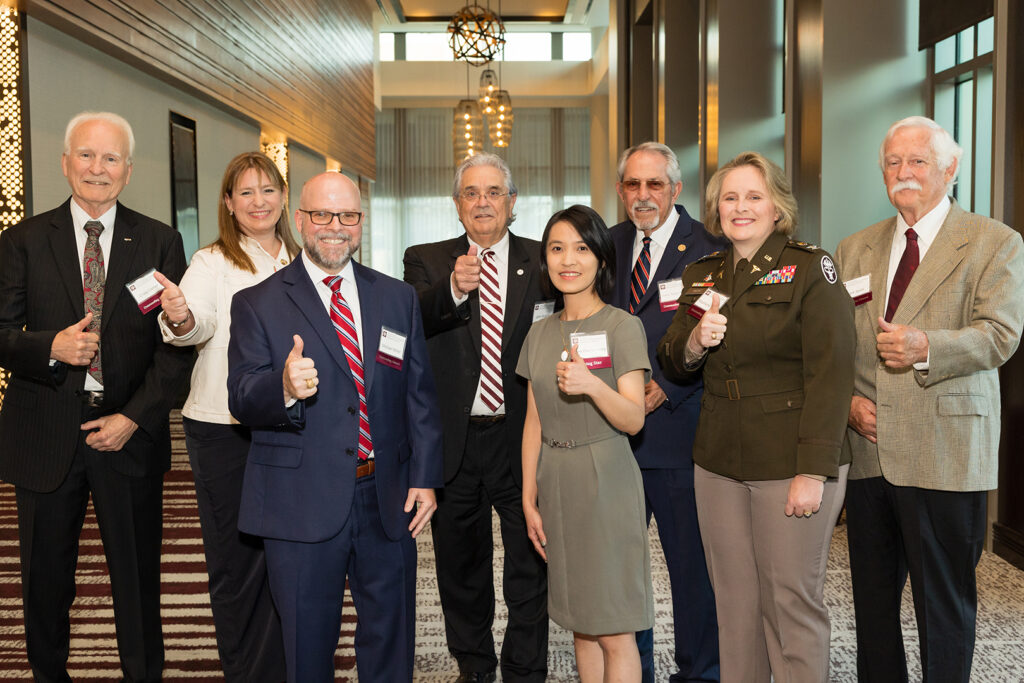
The Texas A&M College of Veterinary Medicine & Biomedical Sciences (VMBS) recognized seven former students at the 2023 Outstanding Alumni & Rising Star Awards Ceremony on May 19.
The Outstanding Alumni Award is the highest honor bestowed by the school and recognizes those who have reached a level of success in their professional careers that brings credit to both the individual and their alma mater. Honorees may be graduates of the Doctor of Veterinary Medicine professional program, graduate academic programs, or biomedical sciences undergraduate program.
Established in 2013, the Rising Star Award recognizes graduates who have completed their education within the last 10 years. These outstanding former students have made significant professional accomplishments early in their careers including public service and volunteer activities that serve to positively reflect upon their alma mater.
Videos about each of the award recipients are available on YouTube.
Outstanding Alumni: Dr. Craig N. Carter ‘81, ‘85, ‘93
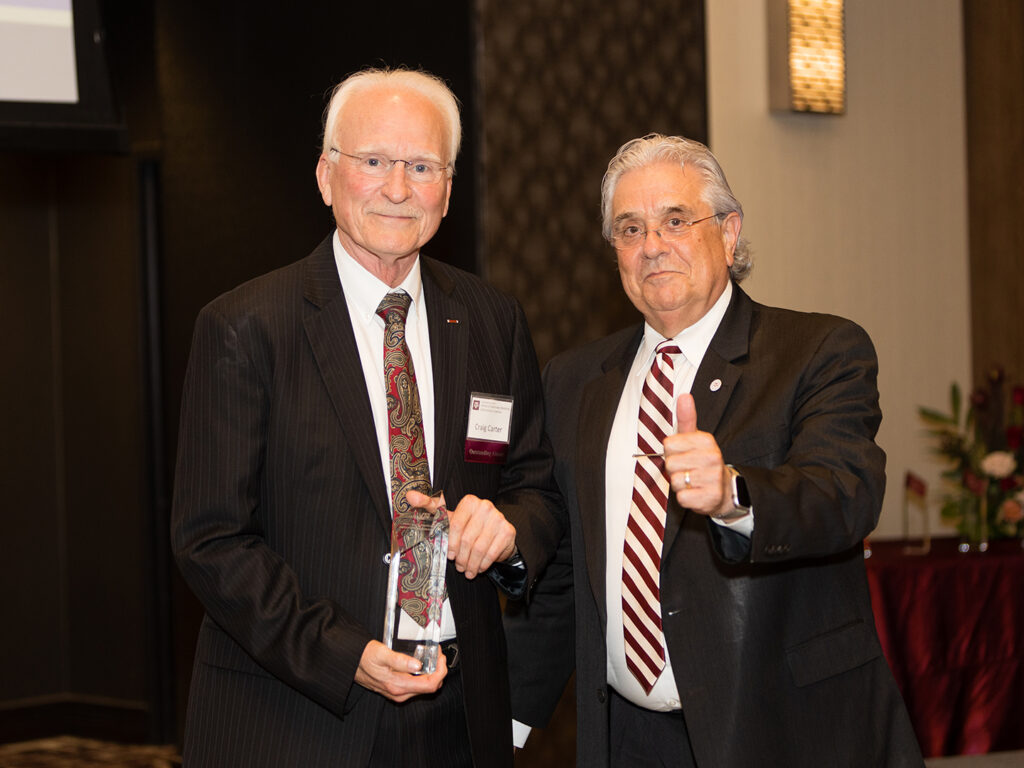
A professor of epidemiology and public health, a 40-plus year veterinary diagnostician, informaticist, military veterinarian, and author, Dr. Craig N. Carter embodies the Texas A&M University core values of selfless service and excellence.
Carter graduated from Texas A&M with a Bachelor of Science degree in veterinary science and a minor in computer science in 1980; his Doctor of Veterinary Medicine degree in 1981; his Master of Science degree in epidemiology in 1985; and his Ph.D. in veterinary public health in 1993.
Raised in Whiting, Indiana, Carter graduated from George Rogers Clark HS. He enlisted in the United States Air Force (USAF) in 1967 and was deployed for Vietnam duty from 1968-1969.
During his tour, he learned about the military working dogs that provided security for the U.S. military, which stimulated his interest in veterinary medicine. Back home, the USAF re-trained him as a computer programmer/analyst to develop software for the military.
Leaving active duty in 1974, Carter was encouraged by Col. Tom Parsons ‘49, Commandant of the Texas A&M Corps of Cadets, to complete pre-veterinary studies at Texas A&M; as a veterinary student, he led a group of citizens to plan for an animal shelter in the Brazos Valley.
After earning his DVM in 1981, he opened an ambulatory practice and continued to work on the animal shelter project, which opened in 1983 as the Brazos Animal Shelter.
During this time, he was recruited by Dr. Konrad Eugster, director of the Texas A&M Veterinary Medical Diagnostic Laboratory (TVMDL), to oversee the development of the first Laboratory Information Management System (LIMS) to serve Texas’ four laboratories. With TVMDL, Carter also served on the pathology necropsy rotation, taught veterinary students, and conducted epidemiological studies using TVMDL case datasets. He also developed software to assist veterinarians with challenging clinical cases in practice.
Carter was commissioned in both the USAF and U.S. Army reserves, and in 1991, he and his wife, Ronda, were deployed with a USAF hospital for Operation Desert Shield. After 9/11, Carter commanded the first U.S. Army Reserve Veterinary Corps unit into Afghanistan, overseeing military working dogs conducting landmine and explosive detection, as well as post security and food safety assurance in the wartime theater. He retired as a full colonel in 2009.
On Nov. 20, 2002, as founding president of the Brazos Valley Veterans Memorial, Craig oversaw the dedication of the memorial by President George H. W. Bush ‘41. He also wrote a biography of Dr. James H. Steele, who started the veterinary division of the U.S. Centers for Disease Control and Prevention in 1947.
“In 2005, Craig was hired by the University of Kentucky after an epidemic of equine abortions and stillbirths that rocked the equine breeding industry in central Kentucky in 2001,” his nomination packet said. “Craig’s expertise in veterinary epidemiology and informatics enabled him to build a successful program of disease monitoring and surveillance for Kentucky. In 2007, Dr. Carter was appointed as director of the UKVDL because of his outstanding organizational, communication, and interpersonal skills.”
Carter stepped down as UKVDL director in 2022 and continues as a professor in the department, working to advance the concept of One Health.
Carter and Ronda, an avid gardener and landscaper, now enjoy life on Freedom Farm together in Spears, Kentucky.
Outstanding Alumni: Michael C. Miller ‘92
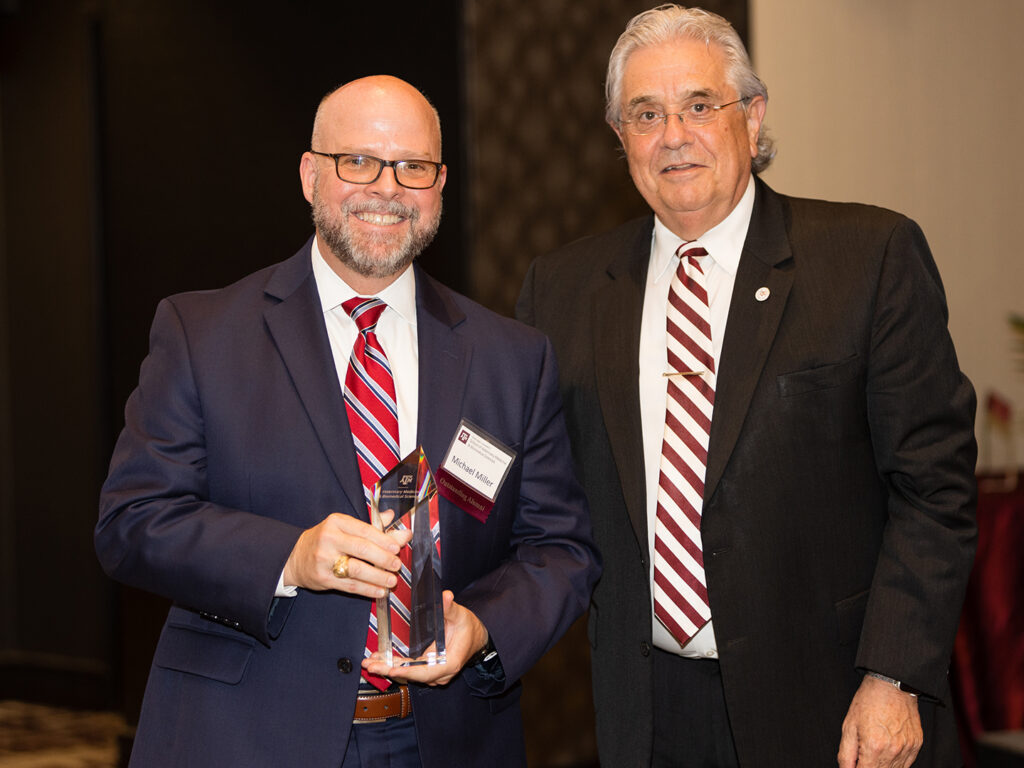
As a chief of police, Michael C. Miller’s career stands out for its uniqueness among graduates of the Texas A&M University College of Veterinary Medicine & Biomedical Sciences.
Miller’s interest in public safety started after high school when he became an emergency medical technician. He later earned his paramedic license while working toward his bachelor’s degree in biomedical sciences at Texas A&M. He also took a year off from school to become a certified police officer.
After graduating from Texas A&M in 1994, Miller entered the private sector as a consultant with Andersen Consulting and maintained his involvement in law enforcement as a reserve officer, and after 13 years in the private sector, Miller moved his family to Massachusetts to pursue a master’s degree in public administration at Harvard University.
He served in positions at the U.S. Federal Bureau of Investigation (FBI) and the Coral Gables Police Department in Florida before returning to Texas to serve in his current role as chief of police in the City of Colleyville Police Department.
“From local law enforcement, to private sector executive, to leadership at the FBI, Chief Miller brings professionalism and innovation to every role,” one nominator said. “It’s no surprise that he has changed the lives of many and enjoys a long list of deep friendships developed over a lifetime of caring for others. He is a decisive leader grounded in the highest level of ethics.”
In the early years of his career, Miller was a regular and reserve deputy sheriff with the Wise County Sheriff’s Department and then a reserve police officer in Addison, Texas. During this time, he also worked as a management consulting executive for Accenture’s Immigration, Justice & Public Security practice.
In 2007, he moved to Washington, D.C., to begin six years of service with the FBI, for which he had roles with the Directorate of Intelligence; the Criminal, Cyber, Response and Services Branch; and, as an FBI detailee to the U.S. Bureau of Indian Affairs.
Later, after five years as assistant chief of police in Florida, Miller finally returned to Texas to begin his current role as chief of police in the City of Colleyville Police Department.
Under his leadership, the Colleyville Police Department received two of the 15 agency awards given in 2021 by the International Association of the Chiefs of Police, despite competing against much larger international cities like London and New York.
“Chief Miller leads a police department that is relatively small in size but large in impact,” a nominator said. “Countless lives have been saved and made better because of his work.”
“Chief Miller is an integral and visible part of the Colleyville community,” another nominator said. “He can frequently be seen attending community functions and events, speaking to local non-profit groups, and giving high-fives to students at schools as they begin a new school year.”
Most recently, Miller led the successful resolution of a terrorist attack on a Colleyville Jewish synagogue in January 2022 where four congregants were taken hostage. In partnership with the FBI, he coordinated 252 law enforcement personnel from 13 different federal, state, and local agencies during the 11-hour incident. Ultimately, all of the hostages escaped without injury and the terrorist was killed by the FBI’s Hostage Rescue Team.
“Chief Miller has demonstrated the highest level of accomplishment and leadership in his profession and in our community,” another nominator said. “He has built the Colleyville Police Department into a top organization that can compete with any worldwide.”
Miller lives in Colleyville with his wife, Amy, and their three children, Anna, Carter, and Lilly.
Outstanding Alumni: Col. Stephanie L. (née Boyd) Mont ‘97, ‘01
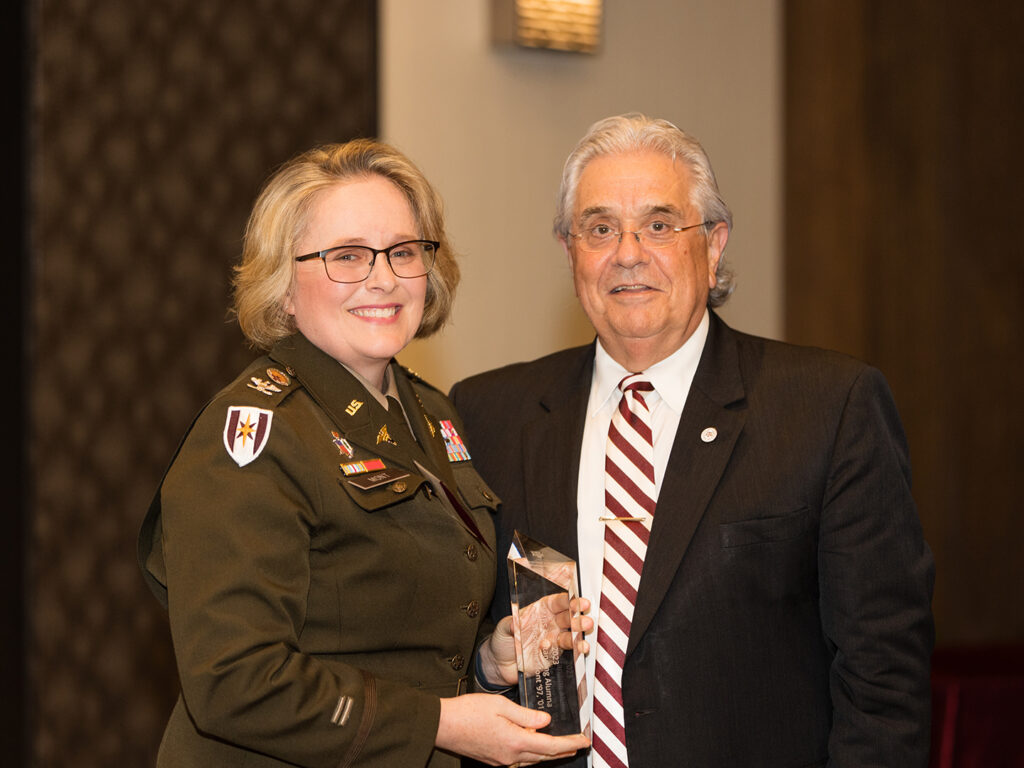
Col. Stephanie L. (née Boyd) Mont’s journey as a veterinary professional took her around the world with a focus on ensuring the health of people and animals as a member of the United States Army Veterinary Corps.
Mont currently serves as the Commander of Public Health Command – Central, which provides regular veterinary service support, environmental health and industrial hygiene support, entomology consultation, public health nursing consultation, epidemiology services, and other public health mission support across 20 states in the Central United States as well as mission support, as needed, throughout Central and South America and the Caribbean. She also serves as The Army Surgeon General’s Consultant for Veterinary Preventive Medicine – a privilege and honor few officers attain.
Mont grew up in a military family with her father, Stephan C. Boyd, completing his undergraduate mechanical engineering degree at Texas A&M University through the U.S. Air Force in 1981. Her mother, Lynn, worked as an administrative assistant in the Texas A&M Department of Agricultural Economics during that time and again when Mont’s father served on an unaccompanied tour in 1984.
Those early years in Aggieland cemented Mont’s desire to attend Texas A&M and pursue an education in veterinary medicine, and she completed her undergraduate degree in biomedical sciences in 1997 and her Doctor of Veterinary Medicine at the Texas A&M College of Veterinary Medicine & Biomedical Sciences in 2001.
As a first-year veterinary student, she decided to join the U.S. Army as a Veterinary Corps Officer immediately upon earning her DVM.
“During her earliest assignments, Stephanie recognized the crucial role veterinary officers play in force health protection,” Mont’s nominator shared. “While deployed in Iraq in 2005, with minimal published doctrine reflective of the operational environment, she developed feral animal and food protection programs supporting the joint force in Al Anbar province. As a major, she served in key positions in the Pacific and Europe Veterinary Public Health Commands. She was instrumental in developing the first multinational veterinary symposium in the Pacific with a focus on increasing pandemic preparedness.”
Mont chose to pursue a career in veterinary preventive medicine, completing her Master of Public Health degree at the University of Hawaii and becoming board certified in the American College of Veterinary Preventive Medicine.
Her commitment to force health protection continued to grow as she advanced through the military ranks. She served as instructor at the Medical Center of Excellence in the Food Protection Branch, leading a team of instructors responsible for executing initial entry and advanced food safety training for veterinary officers and enlisted personnel.
In 2015, after being selected as an American Veterinary Medical Association future leader, Mont worked with nine other leaders in her field to develop a toolkit focused on wellness for veterinary professionals.
“This resource was the foundation for multiple follow-on programs focused on ensuring the health and welfare of the veterinary profession,” Mont’s nominator explained.
From 2015-2017, Mont served as the Commander of the 72nd Medical Detachment, a deployable unit tasked with providing veterinary service support for any global operation. During her command, the detachment deployed to the Middle East, with teams across Kuwait, Jordan, Iraq, and Qatar, ensuring the health of both two- and four-legged warfighters.
From 2017-2020, Mont served as the Command Veterinarian and as the Chief of
Future Medical Operations at U.S. Africa Command in Stuttgart, Germany, working with teams to integrate One Health concepts as they developed theater security cooperation programs in support of the Combatant Commander’s Campaign Plan.
Mont also holds the distinction of being the first veterinary preventive medicine officer to fill the role of director of the LTC Daniel E. Holland Military Working Dog Hospital, the U.S. Department of Defense’s (DOD) only Role 4 Hospital providing support to the DOD’s Military Working Dog (MWD) Training Program and specialty care for MWDs globally.
“Stephanie has balanced professional and personal life with incredible grace and tremendous personal courage and remains approachable and engaging as a leader – no easy feat in the Army – it demands everything of you and then more,” Mont’s nominator said. “She is what selflessness looks like in real life. She consistently gives and she does it with passion and joy.”
Mont lives in San Antonio with her husband, retired Col. Cesar Mont, their daughter, Amelia, and two loveable cats, Mina and Bruno.
Outstanding Alumni: Dr. Henry L. “Sonny” Presnal ‘69
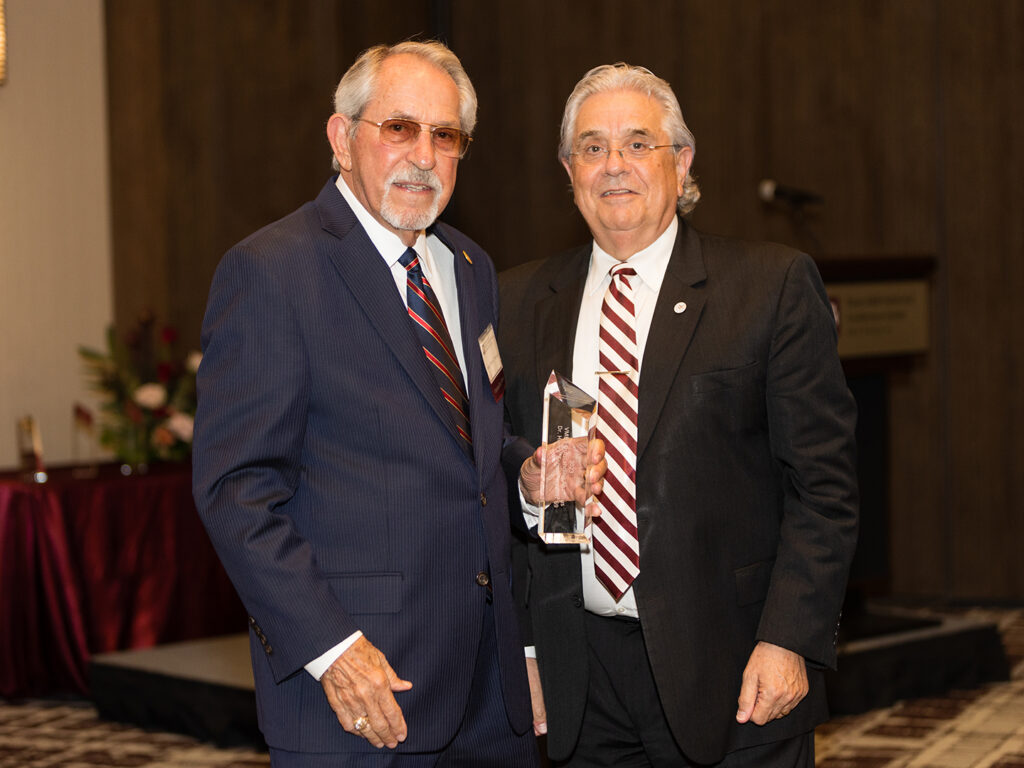
Dr. Henry L. “Sonny” Presnal is well known at Texas A&M University and beyond for his many years as director of the Texas A&M Stevenson Companion Animal Life-Care Center, where 122 pets lived out their lives and nearly 800 companion animals were enrolled to enter the program when their owners were no longer able to provide their care. During his 24 years as director, he also increased the overall endowment of the center by over $30 million.
Presnal’s skills as a leader have been evident since he first began veterinary school as a member of the Texas A&M Doctor of Veterinary Medicine Class of 1969.
“I know him most as the person most responsible for keeping our class together with communications concerning career changes, obituaries, and organization of events,” said one nominator. “He has performed these voluntary duties for decades. Without this function, we would have lost contact with our classmates many years ago.”
Presnal also has organized multiple class reunions and was the principal organizer for the Class of 1969 Endowed Scholarship Fund, which financially supports one veterinary student each year.
Prior to enrolling as a DVM student, Presnal earned a bachelor’s degree in animal husbandry from Texas A&M in 1957. He entered the U.S. Army that same year as an Army aviator, serving three years in Germany and later as an Infantry Company Commander before being released from active duty in 1965 with the rank of captain.
After graduating with his DVM degree, Presnal began a nearly 30-year career in private practice, which included acquiring the Brazos Veterinary Clinic and later establishing Briarcrest Veterinary Clinic, in Bryan.
“He successfully parlayed his military background and professional degree into a position of prominence,” another nominator said. “He has represented our profession with great dignity and utmost integrity.”
During his time as a practice owner, Presnal also entered the world of banking as an organizing director and chairman of the board of directors of College Station’s Commerce National Bank, later opening a branch location in Bryan. After operating the bank for 18 years, the bank was sold to Compass Bank and now operates as PNC Bank in College Station and Bryan.
In 1998 Presnal became the director of the Stevenson Center, a position in which he served for more than two decades until his retirement in August 2022.
“His service has helped many loving pet owners and many future veterinarians by nurturing the human-animal bond and providing care for beloved animals after their owners’ deaths,” one nominator said.
Presnal has received several awards and recognitions over the years, including the Texas Veterinary Medical Association’s (TVMA) Small Animal Practitioner of the Year award in 1992 and the Texas A&M Foundation’s Partner in Philanthropy Award in 2020.
He has also served on the TVMA board of directors and the Texas Veterinary Medical Foundation Board of Trustees. He was chairman of the TVMA Building Oversight Committee and participated in the sale of the partial ownership of the original building to the transition of TVMA’s current headquarters in Austin.
In addition, he has been a member and donor for more than 50 years to the Texas A&M Association of Former Students and the 12th Man Foundation.
Presnal is a life member of both the TVMA and the American Veterinary Medical Association. His late wife, Lou, was president of the TVMA Auxiliary for two terms and served in several other capacities.
“While being very active professionally, Sonny was also active in the Bryan and College Station banking community and his church,” another nominator said. “Dr. Presnal is truly an outstanding veterinarian and human being, representing our profession in all aspects of his life.”
Presnal continues to live in Bryan, where he grew up and attended Bryan schools. He has three sons, one daughter, nine grandchildren, and three great grandchildren.
Outstanding Alumni: Dr. Mark Spire ’74
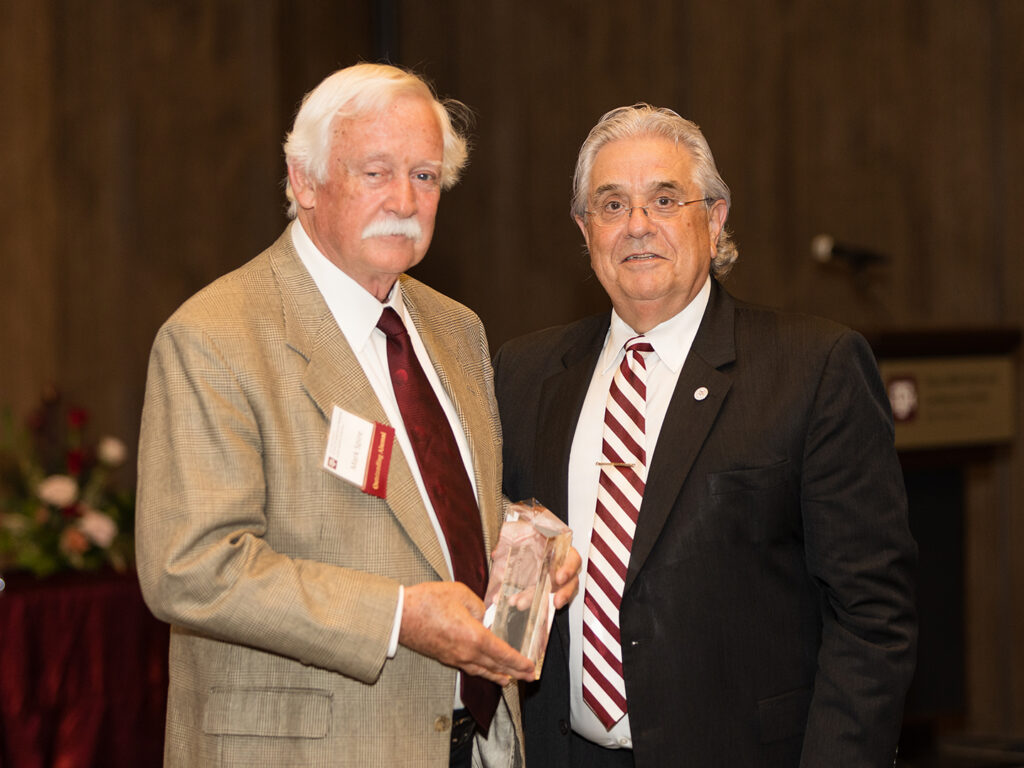
With his innovations, research, and global veterinary connections, Dr. Mark Spire has both revolutionized the field of bovine medicine and made a lasting impression on veterinary medicine by encouraging the development of veterinary professionals.
After graduating magna cum laude from Texas A&M University with his Doctor of Veterinary Medicine degree in 1974, Spire served as a captain in the Army Veterinary Corps for two years.
In 1978, he earned a Master of Science degree at the Kansas State University College of Veterinary Medicine and began working as an assistant professor in the Kansas State Department of Surgery and Medicine, serving as a professor and holding the W.S and E.C. Jones Chair in Production Medicine until his retirement in 2005.
From 2005-2008, Spire worked as a technical services manager at Schering-Plough Animal Health, now Merck Animal Health, a multinational pharmaceutical company. Until his retirement from Merck in 2016, Spire focused on cow/calf and stocker clientele, sales force training, and product development, integration, and management.
During his career, Spire also developed undergraduate and graduate beef-production medicine courses; a certificate program in feedlot health; designed and implemented training programs, including one for veterinarians with the Kansas Foreign Animal Disease Emergency Response Plan; provided more than 2,000 hours of continuing education programs; and conceptualized intellectual property concerning the intranasal delivery of biologicals.
Spire has shared his expertise with ranchers from across the country at the Texas A&M Beef Cattle Short Course, the largest beef cattle educational event in the world.
“The Texas A&M Beef Cattle Short Course is attended by 1,500 cattle producers each year,” a nominator said. “He gets excellent reviews for helping cattle producers understand best cattle health management practices and helping troubleshoot the problems presented by these producers.”
Spire’s commitment to innovating the veterinary field extends to his research, which covered beef quality assurance, animal welfare, stocker health management, and animal disease surveillance. Among his innovations is the development of infrared thermography as a remote, non-invasive diagnostic tool to assess cattle and swine health and performance.
In addition, Spire has mentored hundreds of successful veterinarians, written a multitude of scientific publications, and held positions in professional organizations such as the American Veterinary Medical Association, the American Association of Bovine Practitioners, and the American College of Theriogenologists.
“Many veterinarians across the United States owe a sincere debt of gratitude for Mark’s contribution to their training and professional development,” a former student said. “I will be forever grateful for his leadership, professional guidance, and impact on my life.
Spire also has influenced veterinary medicine at the local, national, and international levels, presenting in countries such as the United Kingdom, Germany, Mexico, and Canada and through the instruction of students from Asia, Central America, and South America. As a result, Spire was recognized in 2013 as one of the 20 most influential cattle veterinarians of the last 20 years by Bovine Veterinarian.
“Dr. Spire has been a leader in the field of production and organized veterinary medicine,” one nominator said. “His dedication to maintaining the highest level of standards and integrity is demonstrated in his vast number of scientific publications, organizations he has led, and influence he has had on the industry.”
He lives in Manhattan, Kansas, with his wife of 53 years, Lynda, who is a university educator and emeritus administrator of the Global Campus at Kansas State University. He has two children and five grandchildren living in the Kansas City area.
Outstanding Alumni: Dr. Anne Wooldridge ‘97
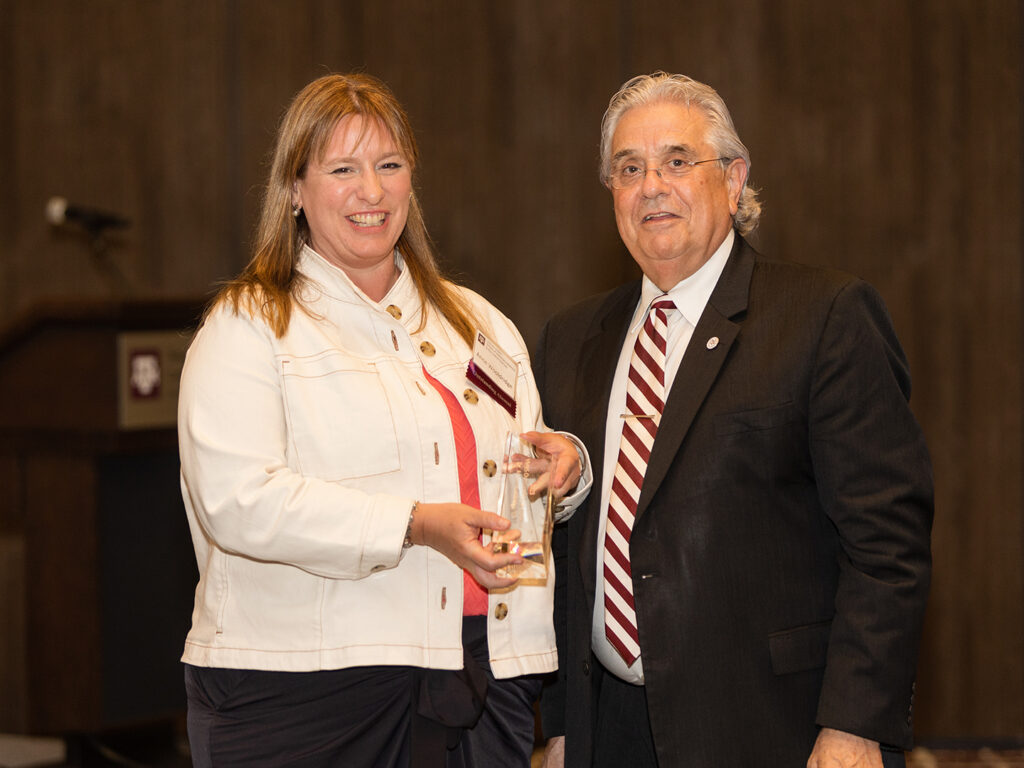
A nationally recognized specialist in equine internal medicine, Dr. Anne Wooldridge is a prevalent force in advancing scientific discoveries, mentoring the next generation of veterinary professionals, and supporting the equine community.
Wooldridge graduated summa cum laude from Texas A&M University with her bachelor’s degree in veterinary science in 1994 and her Doctor of Veterinary Medicine degree in 1997. She supplemented these degrees with a Master of Science in veterinary clinical sciences from Louisiana State University, where she also completed a residency program, in 2001 and a Ph.D. from the Duke University Department of Pharmacology & Cancer Biology in 2005.
Since then, Wooldridge has worked in the Department of Clinical Sciences within the Auburn University College of Veterinary Medicine, first as an assistant professor and now as department head. In her role as department head, a position she accepted in 2021, she leads 70 faculty with large and small animal clinical specialties, more than 60 house officers and graduate students, and resources for academics and research, such as teaching laboratories and equine and farm animal herds.
Wooldridge’s own research interest was sparked at LSU, where she investigated various medications for treatment of esophageal obstructions in horses, and continued at Duke, where she focused on using advanced proteomic techniques to investigate intracellular signaling pathways in muscle cells. Her research as a faculty member at Auburn has focused on equine endocrine disease and tissue engineering.
As a result, Wooldridge has published more than 52 articles in peer-reviewed journals, given 40 invited lectures at local and national levels, and served as principal investigator or co-PI on 28 research projects so far in her career.
“Dr. Wooldridge has demonstrated a commitment to research and scientific discovery as well as graduate student mentoring,” one nominator said. “She understands and supports the need for research and discovery to advance veterinary and human health and well-being.”
Wooldridge’s commitment to her students includes teaching classes on the endocrine, cardiovascular, neuromuscular, and other systems. She also has advised 24 residents and interns who have completed their training in large animal medicine at Auburn.
“Through years of clinical academic practice and the concurrent teaching and mentoring of house officers, graduate students, and veterinary students, she has contributed to the development of countless veterinarians and veterinary internal medicine specialists,” a nominator said. “She has a gift for teaching and engaging her mentees in their education and is dedicated to their success.”
Wooldridge was recognized by Auburn University in 2017 for her work in the advanced training of graduate students and residents with the L.G. Wolfe Award for Graduate Teaching Excellence.
In addition to developing veterinary students, Wooldridge has developed veterinary professionals in the Alabama community through presentations on equine health with groups such as the American Hoof Association, North American Trail Riders Association, and Alabama Farmers Federation.
“Dr. Wooldridge is a servant leader who focuses on the growth and well-being of employees, trainees, and other stakeholders in their organization, with a focus on the greater good,” one nominator said. “By seeking to help the people she serves, they grow as individuals, and in turn they thrive and the organization or institution flourishes.”
By attending yearly veterinary conferences, Wooldridge continues to grow her expertise in equine medicine, and her work has proven invaluable to both her students and to the veterinary community.
She lives on a vegetable farm in Loachapoka, Alabama, with her husband Joel Berquam, who is a physical therapist, athlete, and farmer.
Rising Star: Dr. Cathy Chia-Yu Huang ‘14
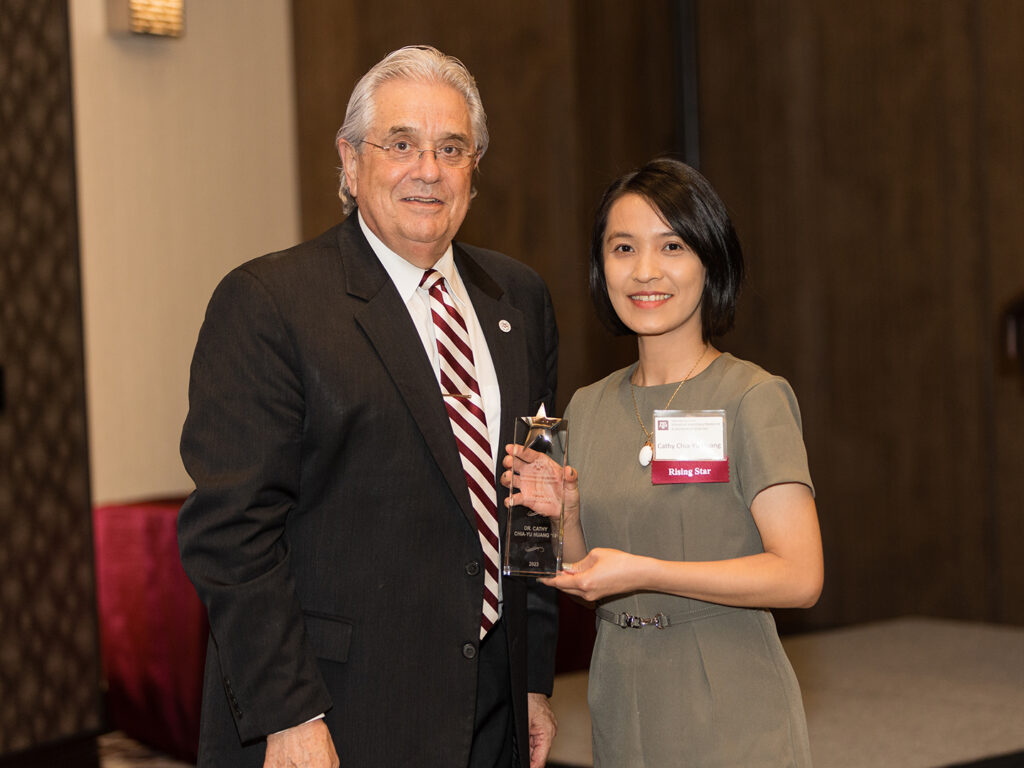
Dr. Cathy Chia-Yu Huang is expanding the biomedical sciences field by exploring the effects of micro- and nano-plastic particles on the brain and by training the next generation of scientists.
After earning her bachelor’s degree from Fu Jen Catholic University, in her home country of Taiwan, Huang graduated from Texas A&M in 2014 with her Ph.D. in biomedical sciences from the Texas A&M University College of Veterinary Medicine & Biomedical Sciences.
At the VMBS, she proved to be an outstanding graduate student, evident by her research achievements and the recognitions she received, according to one nominator.
Her work with Dr. Gladys Ko, an associate professor in the Department of Veterinary Integrative Biosciences, examined how light alters the physiology of retinal cells, which, in turn, affects an individual’s circadian rhythm in the eye. She also investigated retinal dysfunction in animal models of diabetes and high-fat diet. These research outcomes advanced our understanding of retinal function in both healthy and disease state.
“Her doctoral training was highly productive, resulting in six publications in high-impact professional journals; she was the first author on three of these. She also presented her findings at six different scientific conferences during her studies at Texas A&M,” a nominator said. The quality of her research accomplishments was recognized with a variety of awards, including (the school’s) High Impact Achievement Recognition Award, Outstanding Graduate Student Scholarship, and Honors Convocation for Outstanding PhD Student Award.
After graduation, Huang worked as a postdoctoral research fellow at the Texas A&M Health Science Center from 2014-2015 and at Harvard Medical School from 2016-2018.
During her postdoctoral years, Huang explored mechanisms of neuropsychiatric disorders, including alcoholism and schizophrenia. She contributed to seven publications in high-impact journals, with three of them as first author. Her research results provided new insights into treatments of alcohol addiction and schizophrenia.
She moved to Taiwan in 2018 and became a tenure-track assistant professor in National Central University’s Department of Life Sciences. In 2021, she accepted a joint faculty appointment with the Department of Life Sciences and the Cognitive Intelligence and Precision Healthcare Research Center.
At NCU, Huang has received three awards from the Taiwanese National Science and Technology Council (the equivalent of a combined National Science Foundation and National Institutes of Health in the U.S.) to investigate the molecular mechanisms of microplastics affecting the brain and behavior, with a focus on learning, memory, and emotion.
Huang also mentors students and promotes educational opportunities across northern Taiwan.
“When Dr. Huang recruits high-school students for her department, she shares her personal experiences at Texas A&M as well as her experience as an international student,” one of Haung’s nominators said. “Texas A&M’s graduate programs in biomedical sciences are now well known in northern Taiwanese high schools because of her efforts to promote them.”
Huang also serves as a career counselor for life sciences students. Her mentorship includes career planning, assisting in their applications to graduate programs, and reviewing resumes.
“Dr. Huang personifies the hard working Aggie ethics and has established herself as an accomplished researcher in the highly competitive field of neuroscience,” a nominator said. “She is having a global impact on the success of Aggies.”
Huang lives in Taipei City, Taiwan, with her husband and two children.
###
For more information about the Texas A&M College of Veterinary Medicine & Biomedical Sciences, please visit our website at vetmed.tamu.edu or join us on Facebook, Instagram, and Twitter.
Contact Information: Jennifer Gauntt, Director of VMBS Communications, Texas A&M College of Veterinary Medicine & Biomedical Sciences, jgauntt@cvm.tamu.edu, 979-862-4216


